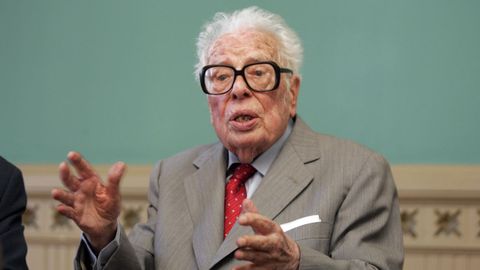
Francisco Fernández del Riego (Vilanova de Lourenzá, 1913-Vigo, 2010). Author: M Moralejo
“The language that is banned in the state media could be used in all the villages, towns and cities of Galicia to listen to the BBC,” praises Professor Antonio Raúl de Toro
London also has two great historical moments for Galician culture. Ocorreu or April 14, 1947 — a little over 11:05 p.m. — when the BBC began or Galician program, a space open to the spread of Galician culture and language in full Francoism and which became the first space for stable radio broadcasting in its own language. The Spanish division of the public company envisioned the production of programs that reflect the reality of historical communities in broadcasts for Spain, and their implementation was entrusted to Ourensán Alejandro Raimúndez, who joined British radio shortly after going into exile in London.
For the programs in Galician, I had fundamental help from Galicia, Francisco Fernández del Riego. “He was the one who channeled everything, he was in charge of seeking cooperation from all the high-ranking people in the country and he typed the texts himself,” says Antonio Raúl de Toro, professor at the University of Coruña and author of the book A Galician from London. Galicia, Great Britain and Ireland in BBC Galician programs (1947-1956)brought to prelo in 1994 only Tambra.
The volume collects scripts from those spaces published in 1956, to which I had access through Del Riego himself, who gave or studied the preserved copies, which are kept by the Penzol Foundation. The other is in the archives of the Royal Galician Academy. On the occasion of Día das Letras Galegas, which this year is dedicated to Don Pac, RAG is now sharing a digital copy of the texts with contributions by Del Riego.
De Toro is an expert on Irish literature. He was looking for documentation related to his field of research when bateu co Galician program. The researcher contacted the BBC to search for successful recordings. The corporation will be destroyed years later in order to avoid further payment of rights to all the workers who participate in it, according to the regulations. The scripts are, why, the only documentary material available about that adventure that brought the Galician language and culture into homes when it silenced them. “The language that is banned in the state media could be used in all the villages, towns and cities of Galicia to listen to the BBC,” extolls De Toro.
Source: La Vozde Galicia
I am David Miller, a highly experienced news reporter and author for 24 Instant News. I specialize in opinion pieces and have written extensively on current events, politics, social issues, and more. My writing has been featured in major publications such as The New York Times, The Guardian, and BBC News. I strive to be fair-minded while also producing thought-provoking content that encourages readers to engage with the topics I discuss.







